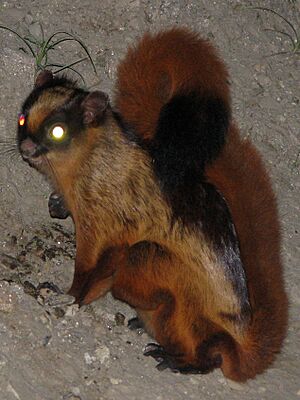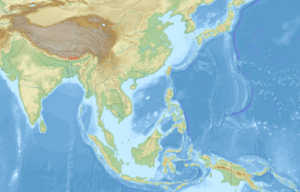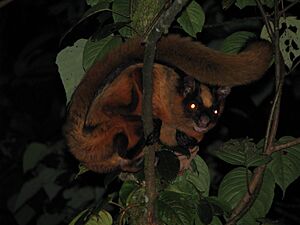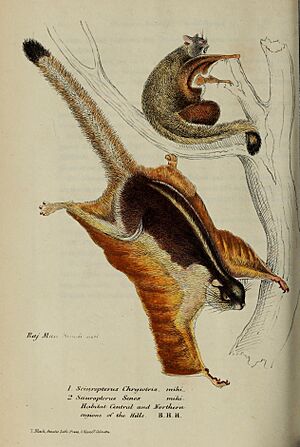Bhutan giant flying squirrel facts for kids
Quick facts for kids Bhutan Giant Flying Squirrel |
|
|---|---|
 |
|
| In Sikkim, India | |
| Conservation status | |
| Scientific classification | |
| Genus: |
Petaurista
|
| Species: |
nobilis
|
 |
|
| Range in red | |
The Bhutan giant flying squirrel is a super cool rodent that lives in the Himalayas. It's also known as the Gray's giant flying squirrel. This amazing creature is one of the biggest flying squirrels in the world!
Like its name suggests, it can "fly" – well, actually, it glides! It spreads out a special flap of skin called a patagium (say: puh-TAY-jee-um) between its arms and legs. This lets it glide long distances between trees, almost like a bat. These squirrels are mostly active at night, which means they are nocturnal.
Contents
Where Do These Squirrels Live?
The Bhutan giant flying squirrel lives in a specific area of the Himalayas. You can find them in parts of Nepal, Bhutan, and some states in India like Sikkim and Arunachal Pradesh.
Scientists think they might also live in Tibet in China, but they haven't confirmed it yet. They prefer to live in forests high up in the mountains.
What Do They Look Like?
The Bhutan giant flying squirrel is truly a giant among squirrels! Its body can be about 35 to 69 centimeters (14 to 27 inches) long. Its tail is also very long, from 38 to 61.5 centimeters (15 to 24 inches). This means the whole squirrel, from nose to tail tip, can be over 1 meter (3 feet) long!
These squirrels have beautiful fur. Their shoulders are often yellowish or orange, and this bright color goes down their sides. This bright color really stands out against their dark, rich brown or maroon back. It looks like they have a dark "saddle" on their back!
Their head is usually dark, but they often have a pale orange or yellowish band across their forehead. Their underside is a lighter color, like pale orange or salmon. Their gliding skin (patagium) is also orange-red. The tail is orange-red with a black tip.
There are two main types, or subspecies, of the Bhutan giant flying squirrel. The western type, found in Nepal and Sikkim, sometimes has a light stripe down the middle of its dark back. The eastern type, found in Bhutan, is usually a bit bigger and has thicker fur.
Not to Be Confused!
For a long time, people sometimes mixed up the Bhutan giant flying squirrel with another similar squirrel called Hodgson's giant flying squirrel. They live in the same area and look a bit alike.
But scientists later figured out that they are different species. They have different fur patterns and are slightly different sizes. For example, Hodgson's squirrel usually doesn't have that light stripe down its back.
Where Do They Live and What Do They Do?
These squirrels live in different kinds of forests in the Himalayas. They can be found in warm, wet forests, mixed forests, and even forests with lots of rhododendron trees or pine trees. They usually live at high elevations, from about 1,500 to 3,000 meters (5,000 to 10,000 feet) above sea level.
We don't know a lot about their daily lives because they are shy and mostly active at night. However, people have seen them moving around during dawn and dusk too. They spend most of their time in trees, but they have also been seen eating food on the ground. It seems they have their babies in March and April.
Are They Safe?
The Bhutan giant flying squirrel is currently listed as "near threatened" by the IUCN. This means they could become vulnerable if we don't protect them.
Their biggest problem is that their forest homes are being lost or damaged. People are cutting down trees or changing the land. They are also sometimes hunted for their meat or fur, or caught to be sold as pets. Luckily, they live in several protected areas, which helps keep them safe.
Images for kids
-
The nominate subspecies of the Bhutan giant flying squirrel, showing the light stripe along its mid-back (a grey-headed giant flying squirrel perched above)








